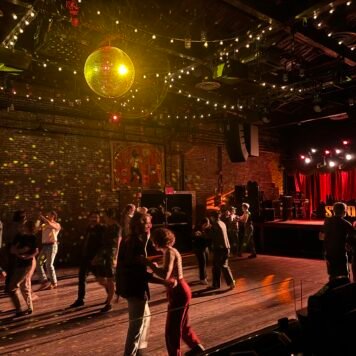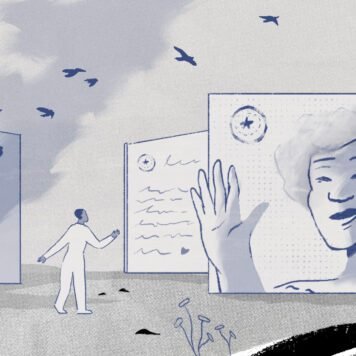It seems like the 2020s keep on dishing out historical moments. And true to this onslaught, on the 24th of June 2022, those of us working on abortion access saw our nightmares come true: the US reversed the landmark Roe vs Wade ruling and effectively struck down the right to abortion.
Whether you saw it coming or not, the global impact is not to be underestimated. As we experienced during Trump’s reign of terror, the US continues to have cultural influence globally, backed up by heady financial campaigns and global media influence.
While countries around the world grappled with reproductive healthcare amidst a global pandemic, the US used it as an opportunity to block and stall abortion access, gaining the dubious pleasure of joining Poland, Honduras and Afghanistan in rolling back reproductive rights in 2022.
It was in response to this crisis that journalist and author Becca Andrews set out to write No Choice, a book which details historical abortion issues pre-Roe v Wade through a series of vignettes with people who have faced the hard reality of accessing abortion in the US.
Across the pond
As someone who was part of the campaign fighting for decriminalisation of abortion in Northern Ireland and co-convenor of the pro-choice organisation Alliance For Choice, I was excited to pick up this book.
Despite our own incredible legal victory in Northern Ireland, like many states in the US before Roe was overturned, true access is still patchy and dependent on your gestation. We are still supporting women and pregnant people to access abortion every single day through our Doula service, despite, on paper, having one of the world’s most progressive laws.
When I speak to Becca, wanting to get her take on the multitude of backward reproductive rights laws, she explains these complex wins and losses were part of her motivation in writing the book. “I want people to connect with the stories in the book as inspiration for action,” she says.
She sees No Choice as a cautionary tale against the refusal of abortion access and the need to see the whole issue through an intersectional lens. The passion and drive of her interviewees throughout the book gives you more than a flicker of optimism. Something all of us need right now.
We begin by talking about the Janes, a women’s collective in Chicago who provided surgical abortions where the state wouldn’t. It is estimated that from 1969 to 1973 the Jane Collective provided nearly 12,000 abortions. They are a prime example of where reproductive human rights abuses have forced people to stand up against ‘illegitimate authority’ and, like with global availability of abortion pills, women and pregnant people are taking power back into their own hands.
I love these narratives as they are so close to what we have tried to do in Northern Ireland. One of the reasons we pushed so much for full decriminalisation was in order to protect the ability to self-manage abortion with pills. It’s also the reason why there is a campaign to decriminalise abortion in the UK, as it still holds serious criminal penalties and there are still issues of access.
Being nimble and staying strong
The history of abortion was paved by people who refused to take no for an answer. In No Choice, we are introduced to the wild and wonderful Pat Maginnis. She’s from an Irish immigrant family and made it her mission to help women find information and help with abortion access back in the 1960s.
I form an affinity with her, one of the many richly drawn people we meet, as a scrappy Irish woman refusing to give in to the status quo. Each person in the book, whether activist or abortion seeker, paints a nuanced and varied picture of abortion throughout the US in the last seven decades. The voices are so diverse, it’s easy to find a bit of yourself in at least one of them.
Reflecting on this, I ask Becca what she wanted European readers to take from her work. She’s clear that she wants us to connect with the people in its pages, but she also wants us to heed the danger. “Those of us within abortion rights activism were saying for ages, ‘we will lose the right to abortion imminently.’ We were dismissed as hysterical. I love that the book lays out what the warning signs are.”
When I tell her that activists in my organisation have begun discussing how we avoid our own rollback, she responds with a genuine tone of relief. “I’m glad, because it’s been really scary over here and I don’t wish that for y’all!”
We talk a little about Becca’s upbringing in a strict religious household in rural Tennessee, where her working class family is still supportive of her work despite a clear difference of opinion on the matter of abortion. I’m sure there is resonance here for anyone who has grown up in a strict religious community or family.
In Northern Ireland for instance, religious organisations gain more access to power than they might in Scotland and England. It’s more akin to the bible belt of America, many of our biggest party leaders have strong religious roots and powerful religious lobbies, but that power is waning, unlike in the US where it seems to be growing in influence.
Sadly however, schools in Northern Ireland are still plagued by religious influence and the majority only provide abstinence-based sex education, which excludes LGBTQI+ pupils entirely and ignores important issues like consent and healthy relationships, which can prevent sexual violence.
My own school brought in a religious organisation to warn us of the dangers of sex when it was already too late for most of us! These groups are the same or linked to those who want to prevent abortion in all circumstances, deeply fundamentalist versions of Christianity. One of the community projects I was involved with is actively campaigning to see that changed, but there is still a long way to go.
Like myself, Becca explains that her own sex education was abstinence focused.
“It wasn’t until I was older that I even understood the mechanics of sex, or what parts of my body were called,” she explains. “Being able to understand my body and how it works; sex, sexuality, and power, made a huge difference in my life. There’s so much power in giving people the resources to make their own informed decisions.”
Subscribe to shado's weekly newsletter
Exclusive event news, job and creative opportunities, first access to tickets and – just in case you missed them – our picks of the week, from inside shado and out.

Reframing stigma
Across the globe, even where progress has been made for abortion access, Becca’s book reminds us that there will always be a need for decent sex and relationship education and a concerted effort to normalise abortion, in order to keep access to abortion safe and legal and as a necessary and common part of our reproductive lives.
“Education can go a long way. So much activism is focused on destigmatising abortion, trying to make it less scary.” Becca explains, “Abortion is a normal medical procedure, people get abortions every day. That is powerful!”
I ask her what the greatest chinks of light for clawing back some autonomy might be.
“A lot of the country was shocked when Roe was reversed, but reproductive justice advocates said, ‘we’ve been preparing for this for years, and we’re going to keep doing the work no matter what!’ When I see reproductive justice activists stepping up, it gets me out of bed in the morning.”
By the time we ended our cross-Atlantic conversation, we had made dozens of connections between what is happening there and here, namely how we are fighting regression when we should be pushing for progress.
From where I am standing, there is never enough of this writing nor does it often enough centre abortion seekers. Through Becca’s writing however, we get to meet people across the USA who have had abortions, who ‘aid and abet abortion’ and are standing firm in their efforts to maintain access, despite the law.
We talked about how a global solidarity movement could gain by learning tactics from each other and reflected on the potential power of trans-national strategies. Ultimately we all benefit from learning about our abortion movement forebears, regardless of their country of residence. Below are some ways we can all educate ourselves a little closer to home.
What can you do?
- Becca Andrews has a great archive of abortion writing on Mother Jones and even Teen Vogue and Reckon News
- To ensure you are across the history and impact of Roe v. Wade, make sure you read the sometimes despairing but ultimately hopeful, “No Choice”
- If organising around abortion, be intentional about putting people in leadership who have experienced barriers to care and who understand what it takes to be able to get an abortion if you are low income, if you’re a person of colour, if you’re disadvantaged.
- Read some foundational reproductive justice texts like the powerful one from the Combahee River Collective, read about Sistersong and their work.
- If you are based in the UK follow the Reproductive Justice Initiative and Abortion Rights UK
- In Northern Ireland follow Alliance for Choice Belfast
- Or Alliance for Choice Derry
- In Ireland follow the Abortion Rights Campaign
- For Europe follow the newly launched Supporting Abortions Forever
- Read more articles on the topic of reproductive justice on shado











